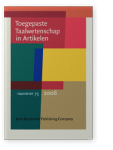Vol. 75 (2006) ► pp.19–28
The Effect Of Age On Working Memory Capacity And Syntactic Processing
The role of WM in syntactic processing has been discussed extensively in the literature. Some researchers claim that a single working memory capacity is used during processing (Just & Carpenter, 1992), and there are others who claim that language comprehension and syntactic processing can be divided into two stages (Caplan & Waters, 1995). This study examines the relationship between age, working memory capacity and on-line /off-line syntactic processing, using Dutch stimuli in self-paced reading task and a reading span task. The results showed that WM capacity significantly declines with age. The self-paced reading times of the Dutch subject/object ambiguities showed a significant quantitative difference between the two age groups, but not a qualitative difference: the elderly group read significantly slower than the young group but the pattern of the reading times was identical for both age groups. Off-line, the results of the comprehension questions show that comprehension was affected for the elderly group in the items that demanded less WM capacity compared to the young group. No age-effect was found in the results of the comprehension questions in the WM-demanding items. Overall, this study cannot support the claim that a single WM capacity is used for syntactic processing and comprehension.
Article language: Dutch
